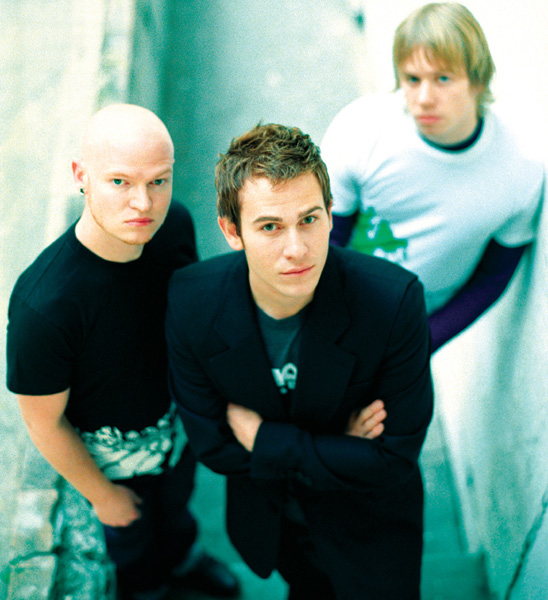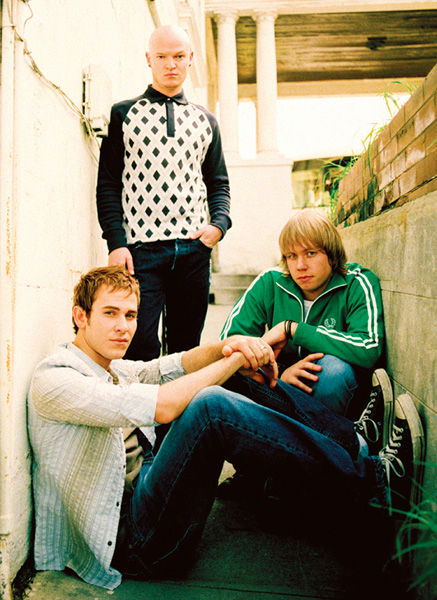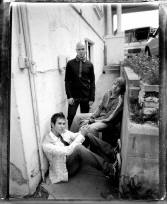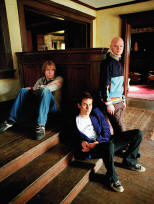

PopEntertainment.com >
Feature
Interviews - Music >
Feature Interviews K to O > Lifehouse
 LIFEHOUSE
LIFEHOUSE
HANGING ON THE
CHARTS
BY JAY S.
JACOBS
Copyright ©
2005 PopEntertainment.com. All rights reserved.
Posted:
May 28, 2005.
Do
you know what was the most played radio song of the year in 2002? It's
not "Jenny on the Block." Not "A Thousand Miles."
Not "Hot In Herre." Not "Complicated." Not "Without Me."
Not "With Arms Wide Open."
No,
the song that logged more airtime than any other that year was "Hanging
By A
Moment," the first single ever released by Lifehouse. The hit propelled the band
– made up of lead singer/songwriter Jason Wade,
drummer Rick
Woolstenhulme and bassist Sergio Andrade – to MTV heavy
rotation and on a seemingly never-ending tour whirlwind.
However, an attempt at
artistic growth with the follow-up album Stanley Climbfalll was met
with public indifference, so the band
has switched direction yet again for their third album. The
self-titled disk has a new polished sheen and a new bassist named Bryce
Soderberg. It is the group's most pop-oriented album yet.
As
their new single "You & Me" climbs the charts, drummer Rick
Woolstenhulme sits down with us to talk about the band.
Nice vague question
to start, how did you originally get into music?
Geez, well I was kind of raised in a musical
family. My dad, when I was really little, my dad played gigs four or five
nights a week. So I was raised since I was really little going to gigs with
him. Finally, when I was, I don’t know, nine-ten years old, I convinced him
to get me and my brother a drum set. That’s how it all began. Started
taking drum lessons when I was really young, ended up going to a music
college and then… I was playing with another Dreamworks artist at the time
and I was rehearsing next door to Jason. He and Lifehouse were next door.
I ended up leaving the gig that I was in and they had fired their drummer.
It was random how it happened, because I passed Jason in the hallway every
day for weeks, but we never really met. We always said “hey, what’s up?”
Finally I showed up and I said, hey, I totally know you. But we didn’t
really know each other. That’s when… geez, I’ve been in the band almost
six-and-a-half, seven years now.
I take it from the
band name that you guys were big Who fans?
You know what? There is no tie-in to that. It
was just really random. I mean, we are definitely Who fans, without a
doubt. None of us knew about Pete Townshend’s side… whatever
that is… I guess they call it
The
Lifehouse, right?
Yeah.
Lifehouse was another rock opera that Pete Townshend started as the
follow-up to Tommy. It
never really came out at the time, but a
lot of the songs from the
project ended up on the album
Who’s Next…
Right. There is no tie-in.
We’re lucky, I guess he didn’t patent it or whatever because
otherwise we’d have been sued by now. (laughs)
So we have the rights to it, I guess, which is cool.
You ended up using
it, he didn’t, so it worked out…
(laughs
again)
Your first album,
No Name Face, had “Hanging By
A Moment” which became a huge hit. I actually read, which kind of surprised
me, that it was the most played song of 2002. Were you surprised by how it
caught on?
Over the top surprised. What had happened, we
were all so young, we were all a bunch of kids out on the road… living our
dream just being out on the road. The fact that the song came out and
was that big was such a shock to us. We ended up touring nearly four
years on that record. It was a big whirlwind. I don’t think we
really got to sit back and understand how big it was until it was all over
and we were at home, watching TV, going, “wow, we were just touring for the
past four years on such a massive hit.” It
def initely
was a shock. We’re very thankful for that song. We’re not like
most bands where, you know, they hate playing their hit. We play that
song every night. We still all love it and we still get the same
response. It’s definitely a good thing.
initely
was a shock. We’re very thankful for that song. We’re not like
most bands where, you know, they hate playing their hit. We play that
song every night. We still all love it and we still get the same
response. It’s definitely a good thing.
The follow-up album,
Stanley Climbfall, did not do
as well as well as the debut, though there were some cool songs
on that, too. Why do you think that album may have been somewhat
overlooked?
Right. You know, I have
friends that are even like, “when are you guys going to put out a second
record?” It’s like, dude, we just put out our third record. But, you know
what? I don’t know, we love that record because for one, we were coming off
the road directly going into the studio to start working on the second
record. There wasn’t a lot of time of like going home for a couple of
months and breathing a bit and seeing life outside of the tour bus and your
bandmates. I think the fact that the record didn’t sell millions of copies
and wasn’t a huge smash… it was to us a more creative, different kind of
record. In a way it gave us the chance… when we went in to make this album
there was no pressure whatsoever. Because we had a big first album and the
second record, I guess to the public, didn’t live up to the standards or
whatever. (laughs)
Now, so we go to studio going, well who cares? We want to make the best
record we can make, regardless of whether people are waiting for it or if
they even care about it anymore. Now, I think we’ve done that.
It may be my
imagination, but the new album seems a little more laid-back and
acoustically-based than the first two. It still rocks, but it doesn’t
seem quite as hard and a little more melodic. Was that something you
were planning on, or something that just came from the songs that Jason was
writing.
It definitely [just] came.
This record; there is nothing on this record that is planned, at
all. There was no time when Jason and I sat back and we were like, well
let’s go for this vibe, or let’s go for this vibe. We had the songs and we
knew what we could do with them, but instead of over-thinking
them and saying “let’s put these really heavy guitars on this part,” you
know, planning out each detail of the songs, we said, “screw it, let’s just
record. Let’s play the songs where everything feels good, and then at the
end, we’ll suss [it] out. That’s why this record
was recorded so quickly. There was no preproduction. There was no
thinking, we just went in and recorded it. It took
like a month-and-a-half. Before we knew it, it was done. It was
being mixed. And we were like, “wow. Shit, did we finish
it?”
Did the change in
direction somewhat come from production
from John Alagia (who has
worked with Dave Matthews Band and John Mayer) rather than Brendan
O’Brien (Pearl Jam and U2) like on the first two albums?
Well, those two names are both quite amazing.
In my opinion, John has a very carefree way of working where he almost, he
makes you not think. By not saying anything. You start recording and he
doesn’t say much. And you’re like, “huh.” Not really second-guessing
yourself, but you’re kind of relying on yourself to go… you know what, you
have to have some confidence in what you do, rather than relying on a
hierarchy to tell you what’s right and what’s wrong. He kind of just
corralled it rather than changed a whole bunch of stuff. It was amazing.
That guy, he’s so phenomenal about, like, sounds. I think this is one of
our better sounding records, sonically. We tried recording this like the
old school people did. We used… because nowadays they have ProTools (sp?),
which is like digital tape. We basically just used that as tape, not as an
editing platform to fix and correct mistakes. We tried making this record
live and breathe, you know, live, how we played it. We definitely did
that.
I think “Days Gone
By,” “Undone,” “Come Back Down” and “Blind” would all make terrific
singles. Which song is being pushed?
Right now, the single that’s being pushed is a
track called “You and Me.” A ballad one on there. That’s climbing up the
charts now. I don’t think… we’re not going to even touch another single for
a while. We’re going to try to work this one as much as we can.
At this point in
your career with all the respect you’ve gotten, do you still think in terms
of getting hits?
I don’t know. I mean, the single, the hit,
just the whole quote-unquote hit, it definitely changes stuff, obviously.
Because you get more people at the shows, you get people who know the
lyrics. But our band has been fortunate to have a pretty massive amount of
people who have been following us from the beginning. Even now, the shows
have been selling out and the kids come out and they’re singing stuff off
the new record, which is pretty neat. But, yeah, I guess you need the hit.
Unless you’re Radiohead... they don’t need to
release singles. They just put the records out. But it’s nice to have
another song on the Top Five right now. We haven’t had that since “Hanging
By A Moment.”
 Do you feel pressure
for the new album to connect and become as big as the first?
Do you feel pressure
for the new album to connect and become as big as the first?
No. I mean, I
don’t think so. We’re just trying to stick by the guns of being carefree
and knowing that we do the best we can every day. We try to write the best
songs. We try to make the record sound sonically the best. You only can
do, you know, you’re your own person, so we just do the best we can do.
That’s where we leave it.
Why did you move
from Dreamworks to Geffen?
Geffen has been phenomenal.
I mean, Dreamworks was phenomenal, too. We’ve been fortunate to be
surrounded by good people from the beginning. But, we just got off, taking
two years off, and in the meantime, that was when Dreamworks got bought by
Universal. That’s when Jason and I were going, “Wow, uh… are we going to
have a job?” (laughs)
Because, obviously, we’ve thrown all of our marbles in this. This is what
we plan to do forever. At that point, it was like, “Whoa, am I going to
have to go get a job? What’s going to happen?” And then when Geffen picked
the contract up, that’s when we were like, “Well, cool, let’s just go and
make the record.” There was no hype or buzz about, oh my gosh, Lifehouse is
going back in the studio. It was like, let’s just go record a bunch of
songs and we’ll turn it into the label and see what happens.
I know that Jason is
the main songwriter for the band, but do you do any writing as well?
No, mostly Jason writes everything on acoustic
guitar. He’ll bring the songs to the table and we’ll arrange them together
and talk them through and cut out some fat if we need to. But, for the most
part, he’s just a phenomenal writer for his age. I’m very fortunate to be
in a band… you know, because I’ve always dreamed of playing for like James
Taylor or artists that have that kind of credibility songwriting. So, I’m
very fortunate that I’ve hooked up with one…
Well, speaking of James Taylor, when
he was releasing songs, you used to
be able to hear rock, pop, country and soul on the same station, and that
just doesn't happen anymore. Do you think that can make it tougher for a
band to find an audience?
Right, right, especially nowadays. I think, quote-unquote, a
band like three or four guys are playing live instruments, like Led Zeppelin
did or like the Beatles did… Top Forty radio is so rhythmically driven right
now, it’s almost like you don’t even see in the charts an actual “band”
band. There are some, like Green Day, that are floating around, but it’s
tough, because when we go in to make records, we don’t go let’s make this
one Hot AC, or let’s make this one this… We just play it. It sucks that
there are the little genres and the little pockets of where you can fit.
But, at the end of the day, bands like U2, or Coldplay, they seem to be just
doing what they do, and if the people connect with it, then it’s a powerful
thing. That’s what we’re trying to achieve. Just have the masses connect
to the lyrics and connect to the songs.
Do you ever have the sinister urge to record a “Feelings” or
“Wind Beneath My Wings?” And if so, what do you do to combat it?
No! Definitely not! (Laughs) Well, you know what;
we all look at ourselves as being artists, being painters. I think any
painter that has been doing it for a good amount of time is not going to go,
well tonight I’m just going to paint a big picture of Mickey Mouse. I mean,
maybe, but at the end of the day I think that person would be more happy
painting something that is going to be creatively stimulating, or is going
to push people a little bit. Make people look at it and get effected in
some way.
Who are some of the artists who inspired you to get into
music?
Oh, geez, all of the classic stuff. David Bowie. The
Police.
I noticed listening to “Come Back Down” that Jason seemed to
be doing a Bowie thing vocally.
Wow! We haven’t gotten that. Wow, you’re the first one that
said that. That’s kind of cool. We’re fans of all the classic stuff. To
tell you the truth, there’s not a whole bunch of new bands we listen to.
Just because of the fact that the old classic records like the Beatles and
Cat Stevens – stuff that’s still selling tons of records – that’s timeless
stuff. Everyone, they grow older and then they tell their kids you’ve got
to buy a Badfinger record or a Beatles record. So we try to always try to
be surrounded and listening to the great stuff like the Police and the Beach
Boys’ Pet Sounds. Some of those records, just sonically, through a
pair of speakers, are mind-blowing. We’re trying as hard as we can to, you
know, put ourselves into that same bowl of soup, I guess.
 A few years ago I caught you opening for Matchbox 20 in
Philly. Are you touring with the release of the new album?
A few years ago I caught you opening for Matchbox 20 in
Philly. Are you touring with the release of the new album?
Well, we’ve started this tour that we’re on now a little over
a month ago. We’ve been doing theaters and big clubs. I don’t think this
is our announced headlining tour. We’re easing back into it I guess. But
we are playing full-blown 90 minute headlining sets. It’s been great.
Hopefully, it’d be nice to hook up on another tour, just because that’s like
the traveling slumber party, if you get on a bigger bill. But, it’s nice,
because these are intimate shows and we know that everyone that’s buying a
ticket knows some of our older music and knows some of the songs… like
because we’re playing some songs that aren’t on records. Some more indie
tracks that people have been wanting us to play for years. We’re kind of
busting out some stuff that we haven’t done…
Yeah, I noticed when I was looking at your info on the All
Music Guide that it said in your discography that the band had released an
album in 1994, which was kind of odd because your bio said that you were
formed in 1996.
Well, you know what? Right before Lifehouse, there was a
version of the band called Blyss. That’s probably the record they’re
talking about. (Ed. note: That is not the CD listed,
it must have been an error on the part of the AMG – perhaps an earlier band
with the same name.)
In the end, how would you like people to see your music?
Ooh, that’s a toughie. I think we’re a band that definitely
strives on lyrical content, but we try to have strong points in more than
just one thing. Like, the music, the sound of the songs, the feel of the
tracks. We try to just make timeless music where it can connect with
people, basically. That’s big picture, I guess.
Are there any misconceptions you'd like to clear up?
Definitely. (laughs) From day one, we got
pigeonholed into being a Christian band or a religious band. We still get
that, but at the end of the day, it’s definitely not a Christian band. We
are just a full-on rock band that makes records, that tries to make the best
albums we can. We’re not in any kind of genre or pigeonholed into any kind
of… we don’t have any title, entitlement or anything. We’re not a religious
band, we’re just a rock band.
Email
us Let us know what you
think.
Features
Return to the features page
